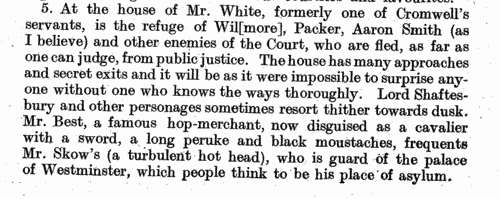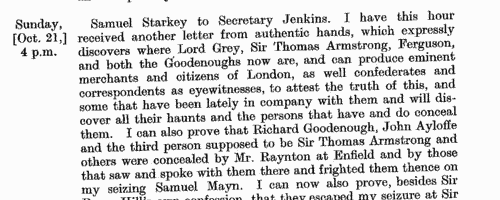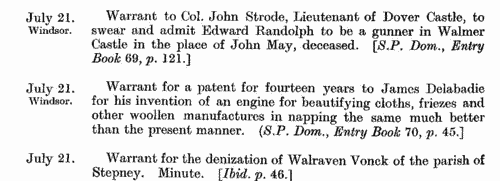Add this eBook to your basket to receive access to all 206 records. Our indexes include entries for the spelling purves. In the period you have requested, we have the following 206 records (displaying 11 to 20): These sample scans are from the original record. You will get scans of the full pages or articles where the surname you searched for has been found. Your web browser may prevent the sample windows from opening; in this case please change your browser settings to allow pop-up windows from this site. Home family archives
(1424-1671)
William Fraser of the Historical Manuscripts Commission examined the archives of the Earl of Home at Hirsel (near Coldstream in Berwickshire), and prepared this calendar, published in 1891.The most detailed account is of 'Documents, more or less of a Personal Nature relating to the Principal Members of the Family of Home' (pp. 87-107), and 'Old Charters and other Documents still in the Charter Chest at Hirsel, relating to Lands formerly possessed by the family' (107-170), with deeds relating to Auldcambus, Aldcathy, Arbirlot, Bedshiel, Bogend, Braidley, Brigham, Brighamshiels, Chirnside, Coldingham, Cowdenknowes, Crailing, Dalswinton, Derington, Dunglas, Eccles priory, Eltrive, Eskdale, Ewesdale, Fogo, Gordon, Greenlaw, Greenwood, Haddington, Harden, Hassington, Hassendean and Horsliehill, Hoscoat, Howlaws, Howpasley, Huntlywood, Jedburgh, Lambden, Lauder, Letham, Leyacres, Luchheild (in Fife), Mawdristoun (Manderston), Maw (in Fife), Mawes (in Perthshire), Mellerstain, East Nisbet, Samuelston, Smailholm, Sprouston, St Bothans (St Bathan), Swynset, Thornton, Tinneis (in Yarrow), and Upsetlington. Fraser was then allowed to inspect the family charters held by their law agent in Edinburgh in nine charter chests, and gives abstracts of the early items that he considered important. This volume also contains his calendar of some of the muniments of the Duke of Athole at Blair Castle, Blair Athole, concentrating on family correspondence from 1473 to 1721: this is also included in this index. | Sample scan, click to enlarge

| Official Papers
(1676-1677)
The State Papers Domestic cover all manner of business relating to Britain, Ireland and the colonies, conducted in the office of the Secretary of State as well as other miscellaneous records, including lists of passes to travel abroad. This edition by F. H. Blackburne Daniell, covers the period from 1 March 1676 to 28 February 1677, and was published in 1909.
| Sample scan, click to enlarge

| Official Papers
(1682)
The State Papers Domestic cover all manner of business relating to Britain, Ireland and the colonies, conducted in the office of the Secretary of State as well as other miscellaneous records.
| Sample scan, click to enlarge

| State Papers Domestic
(1683)
The State Papers Domestic cover all manner of business relating to Britain, Ireland and the colonies, conducted in the office of the Secretary of State, as well as other miscellaneous records. This calendar of the records from 1 January to 30 June 1683 was prepared by F H Blackburne Daniell, and published in 1933. It covers material from State Papers Domestic, Charles II, 359, 422-426; Various 9 and 12; Entry Books 50, 53-57, 63, 66, 68-69, 164, 335; Signet Office 1 vol II; King William's Chest 3; State Papers Scotland Warrant Books 7 and 8; State Papers Ireland 341, 343 and Entry Book 1; State Papers Channel Islands 1; and Admiralty 77 (Greenwich Hospital, Newsletters, Original), 2.
| Sample scan, click to enlarge

| Official Papers
(1683-1684)
The State Papers Domestic cover all manner of business relating to Britain, Ireland and the colonies, conducted in the office of the Secretary of State as well as other miscellaneous records. This covers October 1683 to April 1684. | Sample scan, click to enlarge

| State Papers Domestic
(1684-1685)
The State Papers Domestic cover all manner of business relating to Britain, Ireland and the colonies, conducted in the office of the Secretary of State, as well as other miscellaneous records. This calendar of the records from 1 May 1684 to 5 February 1685 was prepared by F H Blackburne Daniell and Francis Bickley, and published in 1938. It covers material from State Papers Domestic, Charles II, 359, 433, 437 and 438; Various 12; Entry Books 50, 53-57, 69-71, 164, 335; Signet Office 1 vol II; King William's Chest 1 and 3; State Papers Scotland Warrant Books 8 and 9; State Papers Ireland 340, 343 and Entry Book 1; State Papers Channel Islands 1; and Admiralty 77 (Greenwich Hospital, Newsletters, Original), 2.
| Sample scan, click to enlarge

|  Apprentices registered at Edinburgh
(1713-1715) Apprentices registered at Edinburgh
(1713-1715)
Apprenticeship indentures and clerks' articles were subject to a 6d or 12d per pound stamp duty: the registers of the payments usually give the master's trade, address, and occupation, and the apprentice's father's name and address, as well as details of the date and length of the apprenticeship. There are central registers for collections of the stamp duty in London, as well as returns from collectors in the provinces. There was a single collection for the whole of Scotland, made in Edinburgh. The sums collected are recorded in Scottish money, with conversion to sterling for transfer to London. A Scottish pund was worth 20 English pence. July 1713 to April 1715. (The sample entry shown on this scan is taken from a Norfolk return) | Sample scan, click to enlarge

|  Apprentices registered in Scotland
(1723-1726) Apprentices registered in Scotland
(1723-1726)
Apprenticeship indentures and clerks' articles were subject to a 6d or 12d per pound stamp duty: the registers of the payments usually give the master's trade, address, and occupation, and the apprentice's father's name and address, as well as details of the date and length of the apprenticeship. There are central registers for collections of the stamp duty in London, as well as returns from collectors in the provinces. There was a single collection for the whole of Scotland, made in Edinburgh. The sums collected are recorded in Scottish money, with conversion to sterling for transfer to London. A Scottish pund was worth 20 English pence. Because of the delay before some collectors made their returns, this register includes indentures and articles from as early as 1722. (The sample entry shown on this scan is taken from a Norfolk return) | Sample scan, click to enlarge

|  Masters and Apprentices
(1742) Masters and Apprentices
(1742)
Apprenticeship indentures and clerks' articles were subject to a 6d or 12d per pound stamp duty: the registers of the payments usually give the master's trade, address, and occupation, and the apprentice's father's name and address, as well as details of the date and length of the apprenticeship. 1 January to 31 December 1742 | Sample scan, click to enlarge

|  Masters of Apprentices registered at Edinburgh in Scotland
(1750-1754) Masters of Apprentices registered at Edinburgh in Scotland
(1750-1754)
Apprenticeship indentures and clerks' articles were subject to a 6d or 12d per pound stamp duty: the registers of the payments usually give the master's trade, address, and occupation, and the apprentice's name, as well as details of the date and length of the apprenticeship. There are central registers for collections of the stamp duty in London, as well as returns from collectors in the provinces and from Scotland. (The sample entry shown on this scan is taken from a Norfolk return) | Sample scan, click to enlarge

|
Research your ancestry, family history, genealogy and one-name study by direct access to original records and archives indexed by surname.
|












